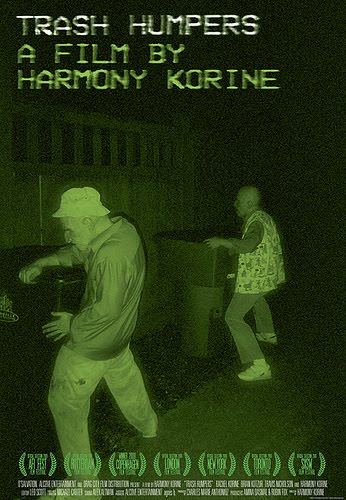 ORLANDO (1992, directed by Sally Potter, 93 minutes, U.K.)
ORLANDO (1992, directed by Sally Potter, 93 minutes, U.K.)
TRASH HUMPERS (2010, directed by Harmony Korine, 78 minutes, USA)
BY DAN BUSKIRK
Eighteen years ago, when I was a new resident of San Francisco, the date movie of the year was Sally Potter’s Orlando. Hip, literary, breezy and oozing with spectacle, it reveled in the type of feminist and gender issues on which the city built it’s reputation as the Gay Capitol of America. Orlando was released a gay lifetime ago, it originally had a lightly scandalous air which has all but dissipated now, yet as its theatrical re-release shows, it remains a slyly humorous and thoughtful fantasy of man and woman and the whims of history.
As entertaining as the film is, the real reason it has been resurrected is because of the still-building success of its star, Tilda Swinton. Currently knocking them dead in the art house hit I Am Love, Swinton has been delivering knock-out performances for years, while staying away from the types of roles that would make her a Hollywood star. Swinton is a bundle of odd features, her bright red hair, statuesque height (just under six feet) her smooth-featured, near-fetal face, plus an intensity that exudes an unusual intelligence, all leading her to play women somewhat more than ordinary.
This makes her perfectly cast as Orlando. Radically re-figured from Virginia Woolf’s 1928 novel Orlando: A Biography, Swinton plays the title character, a young man of the 1600s who is placed under a spell from an admiring Queen Elizabeth I (fittingly played by British gay icon Quentin Crisp) which allows Orlando to escape the aging process. This being England, folks are too polite to notice and Orlando learns of “Death,” “Birth,” “Politics,” “Love,” “Sex,” and “Society” in individually labeled chapters over a lifetime that stretches that four hundred years and beyond. Oh yes, and along the way she quietly changes from a man to a woman, jeopardizing her status in society.
Made on a budget of four million dollars yet looking like it cost five or ten times more, Orlando is a visual stunner, in close company with the theatrically-tinged films Derek Jarman and Peter Greenaway were making in the era. Despite its heavy literary origins it is a light, visual work. Swinton’s was thirty-one when she filmed this yet her Orlando seems like a goofy prankster a decade younger. She makes sly asides to the camera (a chancy technique that works beautifully here) and when it comes time to play the character as female she follows the lead of the novel and maintains the same demeanor “Same person. No difference at all. Just a different sex.” Shot in stunning estates and locations (including the deserts of Uzbekistan) by  Russian Aleksei Rodionov (cinematographer of Elem Klimov’s anti-war masterpiece Come and See) Orlando is about as grand a showcase as an actress could wish. Potter’s career has trailed off into a series of little-seen highly theoretical works yet her idea to put the brilliant young Ms. Swinton at the center of this film has proven, over the course of time, to be her very wisest.
Russian Aleksei Rodionov (cinematographer of Elem Klimov’s anti-war masterpiece Come and See) Orlando is about as grand a showcase as an actress could wish. Potter’s career has trailed off into a series of little-seen highly theoretical works yet her idea to put the brilliant young Ms. Swinton at the center of this film has proven, over the course of time, to be her very wisest.
– – – – – – – – – – – – – – –
Also screening Saturday night. for one show only at the International House, is Harmony Korine’s latest film Trash Humpers. Yes, the title is pretty-much self explanatory, following a bunch of masked weirdos as they cause minor vandalism in the suburbs of Nashville (boy, I make it sound a little like the forthcoming The Expendables in that summary). Even as the director of loved and derided films like Gummo and Mister Lonely, Korine seems to be sliding still further out on the shaky branch of his art, shooting the film with a consumer quality video camera the leaving the image looking like some found document from a fetishist’s stash. You may love the dirty thrill of catching this later on DVD but sharing your discomfort with a crowded theater of rubber-neckers is obviously the superior way to enjoy this summer blockbuster.
